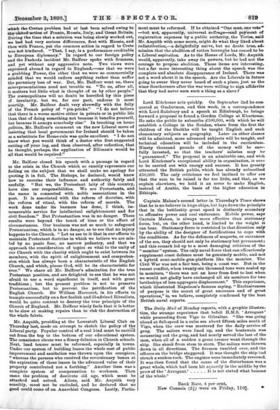Mr. Balfour closed his speech with a passage in regard
to the crisis in the Church which so exactly represents our feeling on the subject that we shall make no apology for quoting it in full. The Bishops, he declared, would know how to exercise their influence and authority fairly and usefully. "Bat we, the Protestant laity of this country, have also our responsibilities. We are Protestants, and the name is connected with noble associations in the past. It is associated with the reform of doctrine, with the reform of ritual, with the reform of morals. The work done under its banners has done, I think, im- measurable service for intellectual enlightenment and for civil freedom." But Protestantism was in no danger. These results were beyond the touch of time or the effect of circumstances. Our business was not so much to safeguard Protestantism, which is in no danger, as to see that no injury happens to the Church. " Let us see to it that in our efforts to maintain Protestant doctrine in which we believe we are mis- led by no panic fear, no narrow pedantry, and that we approach the consideration of topics so vital to the unity of our Church with the charity which ought to exist between its members, with the spirit of enlightenment and comprehen- sion which has always been a characteristic of the English Church, and which, please God, will be its characteristic for ever." We share all Mr. Balfour's admiration for the true Protestant position, and are delighted to see that he was not afraid to use a word significant in itself, and with great traditions ; but the present problem is not to preserve Protestantism, but to prevent the petrification of the English Church. Sir William Harcourt, in his efforts to trample successfully on a few foolish and ill-advieed Ritualists, would be quite content to destroy the true principle of the Church of England. Mr. Balfour wisely feels that it is better to be slow at making repairs than to risk the destruction of the whole fabric.






















































 Previous page
Previous page